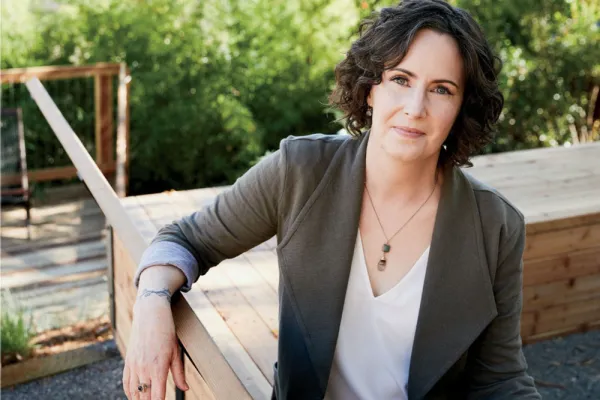An Army at Her Back
Alum News

Published March 8, 2018
Last December, when NBC’s Cynthia McFadden interviewed me and two other women about our experiences accusing actor Dustin Hoffman of sexual misconduct, she asked, “How has it felt? The three of you have been vilified.” I said, “Really? My corner of the internet has been largely supportive.”
From the moment my story accusing Hoffman of sexually harassing me when I was a 17-year-old production intern on Death of a Salesman was published last November in The Hollywood Reporter [THR], the support had been overwhelming, due in no small part to my online community of Smith women. This community was a big reason I wasn’t terrified to go public, because they’d stood behind me before.
The first time I felt nervous on Facebook was when I posted about my abortion, writing that I no longer wanted to feel like a hypocrite for letting other women come forward about an issue I felt so strongly about while I stayed in the closet. When friends reacted by telling me how much they appreciated my honesty, the knot in my stomach dissolved.
When I started writing essays online on Medium—many of which included excruciating personal details—I felt queasy every time I hit “publish,” but the encouraging comments from friends (and from many strangers online) always made me glad I did. I began to understand that public honesty is a muscle that can be developed like any other, especially if you have the right readers. By the time the #MeToo movement began, I was used to feeling exposed.
Although I think I understood intellectually what might happen when I took on a beloved and powerful Hollywood figure, I don’t think anything could have prepared me emotionally. The day before my story ran, the editor called to tell me that Hoffman’s lawyers had scoured all of my social media and tried to get THR to pull the story by saying, “Have you read what she writes? She’s obsessed with sex and guys grabbing her ass. That’s how you know she made this up.”
Nor was I prepared the next day when Twitter trolls blew up my Facebook profile picture until only my teeth showed and dubbed me a ferret (this insult seemed to catch on). It wasn’t the meanness that made me feel vulnerable; it was having my entire online presence examined by people who wanted to use it against me. I was grateful that THR turned off the comments on my piece before I had a chance to read them.
Without my Facebook community, I would have felt very alone. Friends told me they were available, but aside from confiding in my sister and one or two others, I didn’t feel like talking. Where I needed my friends was right where they were: in my comments, making me feel like I had an army at my back.
When Volker Schlöndorff, the director of Death of a Salesman, called my story a teenage “fantasy,” my Smith friends came out in full force: Their comments were scathing, vulgar, hilarious and comforting. I was still exhausted from all the exposure and shaking with rage, but as the comments rolled in, I began to laugh for the first time that week.
Still, every nerve felt raw. As several women reached out to me with their own allegations against Hoffman—many far worse than mine—I began to feel an obligation to get a followup article published. When one woman told me, “You’ve said all that needs to be said,” I wanted to shout, “No, I haven’t! Every story is different, and the world needs to hear them!” I didn’t want all their stories to remain with me.
#MeToo is not, as some crotchety critics have said, about dredging up the past. It’s about changing the future. I didn’t go public for retribution. I wanted to add to the conversation by showing that the men who do this aren’t all monstrous villains like Harvey Weinstein and that victims are often ambivalent. And I wanted other women with similar experiences to feel less alone.
The stories will continue to get messier and less clear-cut, the reactions more divided, and all of this is as it should be. These are still early days of a powerful movement, and no one has a playbook. We have the potential to create lasting change for all the women who come after us, to change the way they move through the world, from childhood to careers to sexual intimacy. But in order for us to do that, the conversation has to continue. And one of the best ways to make sure it does is to keep telling our stories—and to stand behind those who do.
Anna Graham Hunter ’89 is a writer in Los Angeles.
This story appears in the Spring 2018 issue of the Smith Alumnae Quarterly.
Anna Graham Hunter ’89 was in high school in Los Angeles when she alleges Dustin Hoffman harassed her with lewd comments. Photograph by Amanda Friedman